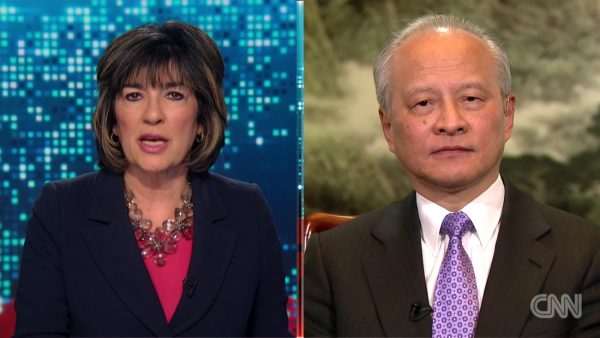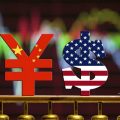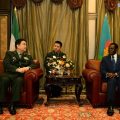
China is not seeking global dominance, and a trade war between the world’s two largest economies would only hurt both sides, Beijing’s top envoy to Washington said on Wednesday as he described the new US National Security Strategy as falling short in looking “truly like a strategy”.
“China is not seeking global dominance,” Chinese Ambassador to the US Cui Tiankai said. “What is important for us is to form a wide-based global partnership to respond to common challenges, and to build a community of nations with a shared and better future.”
Cui made the remarks in a talk with CNN’s chief international correspondent Christiane Amanpour about the US National Security Strategy report and the Korean nuclear crisis.
The report, released by the White House on Monday, called China and Russia “revisionist powers” and regarded them as “competitors” seeking to alter a status quo that favors the United States.
According to the report, both “rival powers” are eroding US security and prosperity and will eventually overthrow the Washington-defined global order.
“We don’t think there is a zero-sum game between any countries, especially between China and the United States,” Cui said.
Countries like the US and China have to follow a very positive cooperative and constructive approach even when they are dealing with differences, because a trade war or a currency war would hurt both countries, he said.
“We have to coordinate our positions,” Cui said, “and try to build a position that will take care of the interests of both countries. We have to proceed on the basis of mutual respect and much better mutual understanding, and bring a win-win outcome for all of us.”
The senior diplomat also made a rare and frank comment on the strategy itself.
“For any strategy to look truly like a strategy, it will need a couple of things: a truly global outlook, a forward-looking vision, and a constructive and cooperative approach,” Cui said. “Frankly, I think the current strategy could be improved in all these aspects.”
The ambassador said stronger economic ties would benefit both countries and peoples.
“Of course we have to recognize the United States is the largest and strongest economy in the world, so very often US macroeconomic policies do have external impact on others, including China,” he said.
Cui said the “conflicting views” about the China-US relationship is not entirely new. “It’s been with us for maybe decades and we have to put our emphasis on the growing common interest and mutual needs between two countries.”
He said the two countries should build on the positive momentum generated by good communication between the two presidents and seek to manage possible differences in a constructive manner.
On the Korean nuclear issue, Cui said China and the US have shared goals on the peninsula, with both standing for denuclearization of the entire peninsula.


